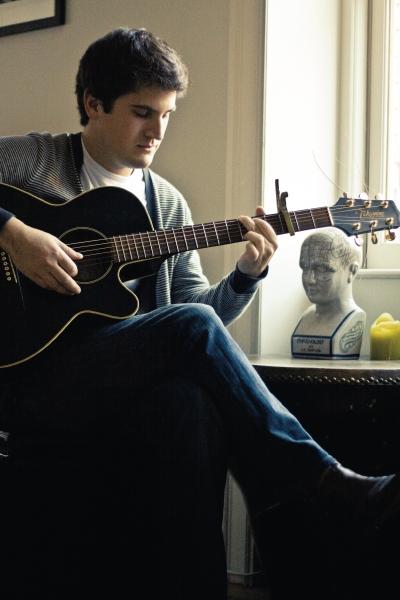
“You sound just like Bob Dylan,” my mom says. She means I can’t sing.
Ever since I was 13, I’ve wanted to be a singer/songwriter. This requires an acoustic guitar, an audible voice, a propensity for rhyming insightful clusters of words, and a following large enough to make a living.
All I’ve ever had is my parents.
I didn’t always like music—maybe because Mom used to persecute me with her Barbra Streisand and Neil Diamond records. Or maybe because I was shy. At Beauvoir, my elementary school, I stood with crossed arms during class performances refusing to sing. “Just repeatedly mouth ‘watermelon’ so you at least look like you’re singing,” my teacher pleaded.
I considered music a form of embarrassment.
That changed in sixth grade when my parents took me to see Tommy, the Who rock opera, at the Kennedy Center. It was then I realized that music didn’t have to be punishment. It could be inspiring.
The next week, Dad took me shopping for my first CD. He picked out Tom Petty’s Into the Great Wide Open. I was hooked—and had to learn how to play guitar.
For my bar mitzvah, my parents gave me a green Takamine acoustic. At first, the notes came hesitantly. After a few months, I was strumming Petty’s “Learning to Fly” and picking along with Cream and Beatles records from my dad’s collection. I stayed sequestered in the basement practicing and getting louder.
“Time’s up!” Mom yelled down to me when the dish pile began to grow. But all I could do was play.
At every family gathering, I brought my guitar. After my base audience—parents, two sisters, grandmother, aunts and uncles—indulged in a few glasses of wine, I started to sing.
Grandma said, “I didn’t even know you had a voice!”
While in high school at St. Albans, I recorded an album on a digital eight-track and gave copies to any friends and family willing to listen. Mom passed back the reviews: “Jeff said it’s great . . . but your voice is a little rough.” I mailed a copy to a PR rep at Sony. She e-mailed me: “Nice lyrics. Lose the singer.”
Dad, a Hendrix and Clapton fan with his own youthful ax-wielding dreams, didn’t let me dwell on failure: “You improve every time I hear you. Just keep at it—stick it to ’em!”
Throughout college in Colorado, I practiced and recorded, imitating Al Green, Lou Reed, the Clash. My song “Spaceships” was included in a student compilation, and I performed for an audience of 200, the final exam for my songwriting class. It was thrilling. My voice hit a few off-key notes, but I played through the mistakes and received my first applause independent of Mom and Dad.
I sent my parents a poster from the concert with my name on it. When I returned home, it was framed in my room.
After graduation, we talked about careers. I mentioned teaching and journalism. They suggested music.
“Dylan made it with a shabby voice,” Mom said.
Dad motioned to a mix CD I had made for him, with music by Spoon and Feist: “I think you sound better than these jerks.”
I said it was time to be realistic.
I’m probably not good enough to make it professionally, but I still play daily. If I ever decide it’s worth a try, I’ll have two unconditionally loyal fans, and that’s not a bad base to grow from.
This article first appeared in the March 2009 issue of The Washingtonian. For more articles from that issue, click here.


















